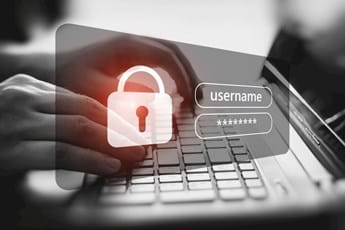Is your internet banking password helping to keep your financial information safe? With more major data breaches making the headlines, complacent internet users are urged to ensure their passwords are helping to keep online accounts safe and secure.
Cybercrime is on the rise
Research conducted in October 2022 by the Australian National University has showed that 1 in 3 Australian adults reported being exposed to data breaches, with that number predicted to be on the rise as more breaches occur. Findings from the study also revealed that cyberattacks were one of the fastest growing types of crimes Australians now face.

In a similar study conducted by Google Australia in 2021, it was found that 34% of Australian adults have had an online password hacked – that’s around 6.6 million people who reported having a password compromised! Despite this alarming statistic, the same study reported that only 42% of adults take deliberate steps to improve their online security while one in ten barely do so and a further 8% don’t take any steps at all.
From their findings, Google Australia reported that security and sharing of high risk passwords was identified as a concern after it was found that 14% of Australians admitted to sharing passwords with family members or friends, and a further 6% admitted to texting or emailing a password to someone! These risky behaviours make it easier for cybercriminals to intercept or obtain passwords to gain unlawful access to online accounts and other personal information.
Don’t share passwords or write them down!
When a password is shared, login credentials to that account are no longer secure. Even if you trust the person, they may not store the password in a secure location or their own device may not be safe.
Writing your passwords on paper is also not a safe practice, especially if all your passwords are kept in the same location such as a notebook. In a public setting or an office environment, passwords written down on post-it-notes (especially those left on desktops or computer monitors) is poor password management. These passwords can be easily accessible or discovered which can make you an easy target for fraud.
A 2021 GetApp survey found that 66% of Australians use the same password across multiple accounts. Whilst it might be convenient and easy to remember, reusing the same password is a bad idea when it comes to online cybersecurity. If you use choose to reuse or recycle passwords, a breach on one site may mean that all of your accounts are compromised. This is particularly important if you have shared or written down passwords as a hacker may now have access to multiple accounts.
Password safety
According to the Australian Cyber Security Centre, weak and simple passwords are easy to guess due to the automated software that hacker’s use. These automated password cracking tools pick out valuable information in databases so it’s important not to use identifying details such as your date of birth when creating passwords. It’s also a good idea to regular change your passwords to help prevent others having access to your data. It is recommended that you update your online passwords at least four times a year to help protect your online accounts.
Shockingly, the online publication CyberNews states that one of the most common passwords used globally is still password or the classic number combination 123456. Choosing to use a passphrase instead of a password makes it harder for scammers to access your online accounts. A passphrase is a sentence rather than a collection of numbers or words. A good passphrase should be difficult to guess and usually consists of an easy to remember phrase. For example, I love dogs could be used as i<3d0gS.
Password managers and multi-factor authentication
Adopting a password manager can help to safeguard your login credentials to your online accounts. A password manager stores a master password and all of your other passwords in one secured location with an encrypted key. A benefit of using a password manager is that you only need to remember the one master password, and most password manager apps are able to generate complex and random passwords.
Where possible, use multi-factor authentication as an additional layer of security to access your online accounts. Using multi-factor authentication means that a password alone is not enough to successfully access your account, and it is a security method that requires the user to provide two or more pieces of evidence that verify their identity in order to be granted access. Firstly, you will be required to enter your username and password, and then the multi-factor authentication may request a code or PIN that is system-generated and sent to an email or mobile number known to the user.
As cybercrime continues to be a concern, it is highly recommended to use both a password manager and multi-factor authentication as added layers of protection against scams. If you believe that someone has accessed your bank accounts without your authorisation or you don’t recognise a transaction on your account, please contact us immediately on 13 61 91.
Sources
https://www.cyber.gov.au/acsc/view-all-content/publications/creating-strong-passphrases
https://www.getapp.com.au/blog/2152/password-security-australians-reuse-of-password
https://www.techguide.com.au/news/computers-news/google-research-reveals-a-third-of-australians-have-been-hacked-or-scammed/
https://www.gridware.com.au/blog/1-in-3-australians-hacked-in-the-past-year/
https://csrm.cass.anu.edu.au/research/publications/public-exposure-and-responses-data-breaches-australia-october-2022
https://cybernews.com/best-password-managers/most-common-passwords/






